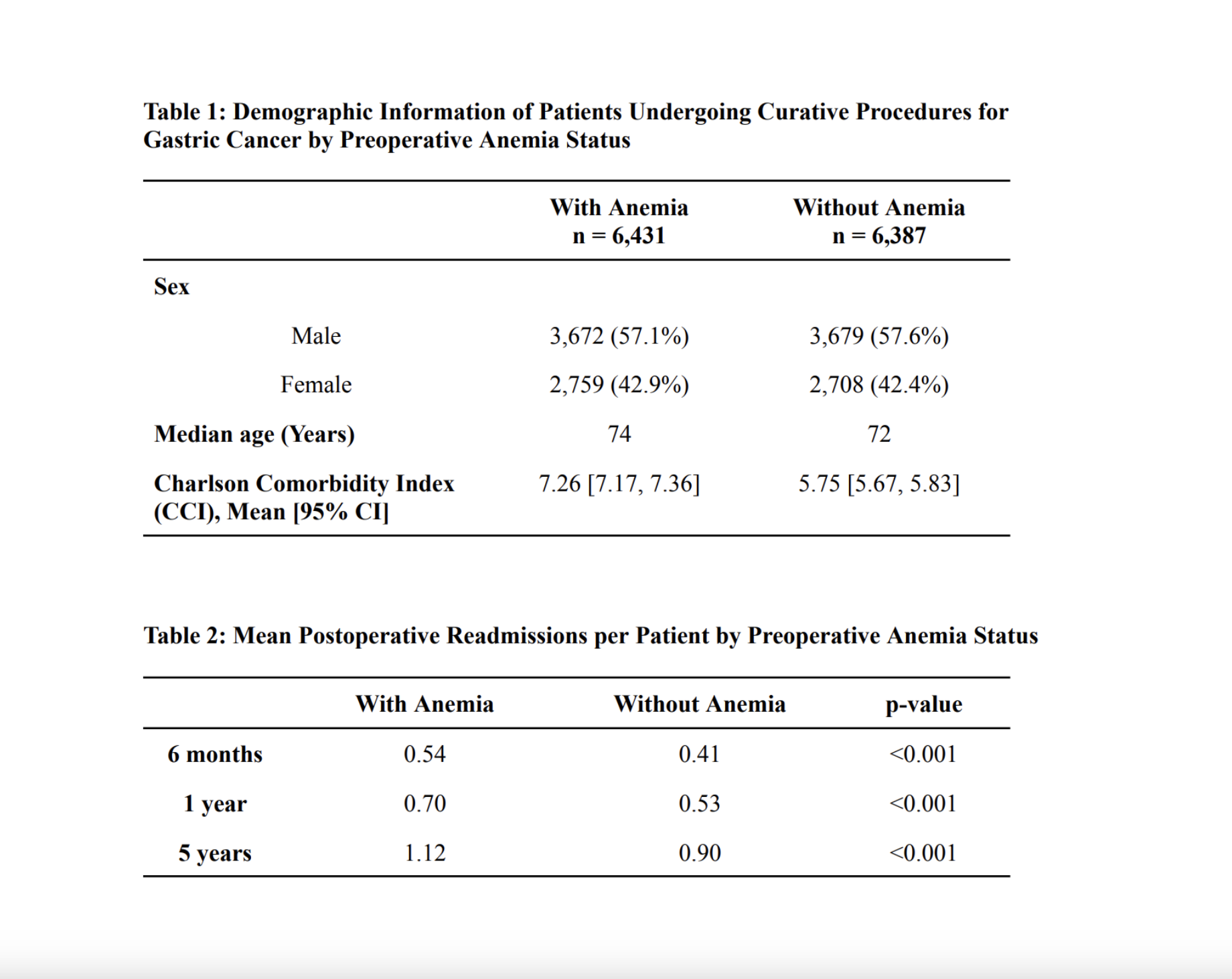Monday Poster Session
Category: Stomach and Spleen
P4197 - Preoperative Anemia as a Prognostic Marker in Gastric Cancer Surgical Outcomes: A PearlDiver Database Analysis
Monday, October 27, 2025
10:30 AM - 4:00 PM PDT
Location: Exhibit Hall

Angeli Sirilan, BS, BA (she/her/hers)
University of Arizona College of Medicine - Phoenix
Phoenix, AZ
Presenting Author(s)
Angeli Sirilan, BS, BA1, Kinsley Wang, BS1, Sophie Nguyen, BS2, Annie Jia, BS1, Allon Kahn, MD, FACG3
1University of Arizona College of Medicine - Phoenix, Phoenix, AZ; 2University of Arizona College of Medicine, Phoenix, Phoenix, AZ; 3Mayo Clinic College of Medicine and Science, Scottsdale, AZ
Introduction: Gastric cancer (GC) is the fourth most commonly diagnosed malignancy and the third leading cause of cancer-related death worldwide. Despite therapeutic advances, survival rates remain relatively poor, highlighting the need for improved prognostic markers. Anemia has been linked to worse outcomes and quality of life across various malignancies. This multicenter study examined whether preoperative anemia is associated with increased mortality risk in patients undergoing surgical treatment for GC.
Methods: The PearlDiver M170 database was used to query patients undergoing curative procedures for GC between 2010-2023 by CPT codes, including endoscopic resection, total gastrectomy, partial gastrectomy, and excisions of stomach lesions. Patients were stratified by presence of preoperative anemia using ICD-10 codes. The primary outcomes are 5-year mortality, defined using CPT codes for hospice or sudden death. Mean postoperative readmissions for each group were analyzed at 6 months, 1 year, and 5 years. Univariate analysis was performed using Kaplan–Meier survival analysis for time-to-event outcomes and chi-squared tests for categorical variables. Multivariable analysis was conducted using Cox regression, adjusting for age and multiple comorbidities including diabetes and obesity.
Results: At 5 years, mortality was significantly higher in the anemia group (log-rank χ² = 7.8; p = .005). In multivariable analysis, anemia was independently associated with increased 5-year mortality (HR, 2.12; 95% CI 1.51–2.97; p < .001). Chronic kidney disease also predicted higher 5-year mortality (HR, 1.42; 95% CI 1.07–1.90; p = .016). Anemic patients also had higher mean postoperative admissions at 6 months, 1 year, and 5 years (p < .001).
Discussion: Preoperative anemia affected over half of patients undergoing surgical treatment for GC. A significantly higher 5-year mortality was observed among those with preoperative anemia, suggesting a potential long-term impact on survival. Possible explanations for the increased mortality in anemic patients include incidence of comorbid conditions in anemic patients, and being a marker for more severe disease. Use of anemia as an independent predictor of poor outcomes in preoperative GC patients may help identify high-risk individuals and guide interventions to improve long-term outcomes. Further studies are needed to evaluate whether preoperative management of anemia can improve long-term survival in patients undergoing surgery for GC.

Figure: Table 1: Demographic Information of Patients Undergoing Curative Procedures for Gastric Cancer by Preoperative Anemia Status
Table 2: Mean Postoperative Readmissions per Patient by Preoperative Anemia Status
Disclosures:
Angeli Sirilan indicated no relevant financial relationships.
Kinsley Wang indicated no relevant financial relationships.
Sophie Nguyen indicated no relevant financial relationships.
Annie Jia indicated no relevant financial relationships.
Allon Kahn: MiMedx – Consultant.
Angeli Sirilan, BS, BA1, Kinsley Wang, BS1, Sophie Nguyen, BS2, Annie Jia, BS1, Allon Kahn, MD, FACG3. P4197 - Preoperative Anemia as a Prognostic Marker in Gastric Cancer Surgical Outcomes: A PearlDiver Database Analysis, ACG 2025 Annual Scientific Meeting Abstracts. Phoenix, AZ: American College of Gastroenterology.
1University of Arizona College of Medicine - Phoenix, Phoenix, AZ; 2University of Arizona College of Medicine, Phoenix, Phoenix, AZ; 3Mayo Clinic College of Medicine and Science, Scottsdale, AZ
Introduction: Gastric cancer (GC) is the fourth most commonly diagnosed malignancy and the third leading cause of cancer-related death worldwide. Despite therapeutic advances, survival rates remain relatively poor, highlighting the need for improved prognostic markers. Anemia has been linked to worse outcomes and quality of life across various malignancies. This multicenter study examined whether preoperative anemia is associated with increased mortality risk in patients undergoing surgical treatment for GC.
Methods: The PearlDiver M170 database was used to query patients undergoing curative procedures for GC between 2010-2023 by CPT codes, including endoscopic resection, total gastrectomy, partial gastrectomy, and excisions of stomach lesions. Patients were stratified by presence of preoperative anemia using ICD-10 codes. The primary outcomes are 5-year mortality, defined using CPT codes for hospice or sudden death. Mean postoperative readmissions for each group were analyzed at 6 months, 1 year, and 5 years. Univariate analysis was performed using Kaplan–Meier survival analysis for time-to-event outcomes and chi-squared tests for categorical variables. Multivariable analysis was conducted using Cox regression, adjusting for age and multiple comorbidities including diabetes and obesity.
Results: At 5 years, mortality was significantly higher in the anemia group (log-rank χ² = 7.8; p = .005). In multivariable analysis, anemia was independently associated with increased 5-year mortality (HR, 2.12; 95% CI 1.51–2.97; p < .001). Chronic kidney disease also predicted higher 5-year mortality (HR, 1.42; 95% CI 1.07–1.90; p = .016). Anemic patients also had higher mean postoperative admissions at 6 months, 1 year, and 5 years (p < .001).
Discussion: Preoperative anemia affected over half of patients undergoing surgical treatment for GC. A significantly higher 5-year mortality was observed among those with preoperative anemia, suggesting a potential long-term impact on survival. Possible explanations for the increased mortality in anemic patients include incidence of comorbid conditions in anemic patients, and being a marker for more severe disease. Use of anemia as an independent predictor of poor outcomes in preoperative GC patients may help identify high-risk individuals and guide interventions to improve long-term outcomes. Further studies are needed to evaluate whether preoperative management of anemia can improve long-term survival in patients undergoing surgery for GC.

Figure: Table 1: Demographic Information of Patients Undergoing Curative Procedures for Gastric Cancer by Preoperative Anemia Status
Table 2: Mean Postoperative Readmissions per Patient by Preoperative Anemia Status
Disclosures:
Angeli Sirilan indicated no relevant financial relationships.
Kinsley Wang indicated no relevant financial relationships.
Sophie Nguyen indicated no relevant financial relationships.
Annie Jia indicated no relevant financial relationships.
Allon Kahn: MiMedx – Consultant.
Angeli Sirilan, BS, BA1, Kinsley Wang, BS1, Sophie Nguyen, BS2, Annie Jia, BS1, Allon Kahn, MD, FACG3. P4197 - Preoperative Anemia as a Prognostic Marker in Gastric Cancer Surgical Outcomes: A PearlDiver Database Analysis, ACG 2025 Annual Scientific Meeting Abstracts. Phoenix, AZ: American College of Gastroenterology.
